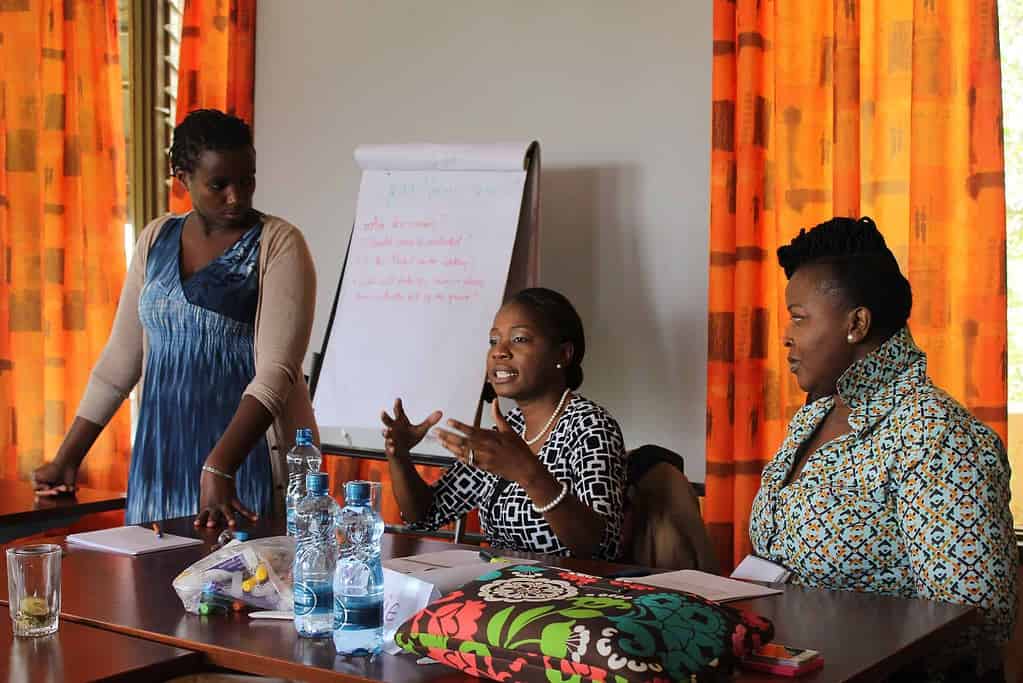What Women Can Do

- Blog
In these uncertain times, when progress towards a more just world sometimes seems to be slowing, or even reversing its course, I often ask myself the question, what can I do? It’s easy to feel small or isolated in the face of so many challenges, many of which seem to have escalated over the past few months.
But on International Women’s Day, there’s an opportunity to ask a different question. This will be a day to reflect on the challenges that women face; The challenges to end maternal mortality, income inequality, violence and oppression, and political disenfranchisement. There is so much work to be done to change the status quo of how women are treated. But today, let’s ask the question: What can women do as the drivers of the changes that are needed, not just for women, but for people everywhere?
In 2015, Acumen took its first hard look at the role that gender plays in our work to invest in and support enterprises that improve the lives of the poor. Our report, Women and Social Enterprises: How Gender Integration Can Boost Solutions to Poverty, published in collaboration with the International Center for Research on Women, showed us how social businesses could integrate women at every level, and the potential for impact and business growth that comes from developing enterprises with a gender lens.
Instead of simply asking how enterprises could help women, we also asked, how could women help build and lead and shape social enterprises? We recognized the role that women play as entrepreneurs launching companies; as the management and leadership helping to drive growth; as employees fueling productivity and economic opportunity; as customers shaping product design and purchasing decisions. As part of the report, we developed a diagnostic tool for gender integration that has been shared with other impact investors and is now starting to inform how we invest.
Over the past year, we have started to integrate a more thoughtful gender analysis into our work beyond our portfolio, recognizing the power of an inclusive approach to engaging men and women across everything we do. Much of this work is nascent, but as we’ve learned from so many of our respected peers and leaders in the gender integration world, you have to start somewhere.
Next week, we will gather all our Acumen Fellows, emerging leaders from across the globe, for the first time in Naivasha. It will be an opportunity for them to share their journeys and support each other as they take on some of the world’s biggest challenges. We have been cultivating this global community of social change leaders since 2006, and believe it is the right time to bring them together to unleash potential and forge meaningful connections. Over 40% of the 279 attendees from across 28 countries will be women, including inspiring entrepreneurs, impact investors, thought leaders and game changers.
Just one example is Faith Muigai, who had a successful career in nursing in the United States before returning to her home country of Kenya to focus in improving access to healthcare. Today, she leads operations for Jacaranda Health, a maternal healthcare clinic in Nairobi that is bringing affordable, high quality maternal healthcare to low income women who often lack access of any kind. Her approach as a leader is to invest in the development of all the personnel in the clinic, and to empower Jacaranda’s clients – the women, as well as their families – with the information and support that they need for healthy births and neonatal care. As a Fellow, she gained access to new skills and new opportunities to reflect in her path as a leader, but more importantly, she gained access to a global network of like-minded peers and mentors who want to see her succeed in her vital work.
Beyond leadership, we are taking a deeper dive into gender through our Impact work, where we are starting to gather large quantities of customer data that will help us understand how our companies are impacting women, and to inform our entrepreneurs of ways they can better engage their male and female customers. We will start to work with a small number of entrepreneurs this year to see how we can support business growth with targeted technical assistance that incorporates a gender lens, and then learn from those experiences to see what we can apply more broadly across our portfolio.
With +Acumen, our global volunteer and online community, we have seen more women than men take advantage of our online curriculum – an unusual data point in the world of MOOCs (massive open online courses). We are excited by the ways that +Acumen course takers (over 400,000 sign-ups) are using the materials and experiences they share through their courses to have a meaningful impact in their own communities.
Though we’re just getting started, we are seeing the power to unleash entrepreneurship, leadership, new ideas and new solutions through an inclusive approach to every facet of our work, and a focus on the impact that women can have. The numbers can be discouraging – when it comes to women entrepreneurs and their access to capital, or deficits in access to livelihoods, healthcare, and often basic choice and dignity. But a new reality is emerging, as women access higher levels of education, leadership opportunities in business and politics, and capital to start and grow new businesses. The world is seeing significant strides in critical areas such as maternal health and inclusive economic opportunity, often because women themselves have taken a major role in leading and changing institutions.
And this trend must not be reversed, whatever setbacks we may see along the way. Perhaps the better question to ask will soon be: What can’t women do?